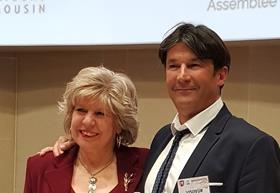
This week saw the annual meeting of AREFLH, the association of European fruit and vegetable regions and producers, in Bordeaux, at the headquarters of the Nouvelle Aquitaine region.
The meeting, coinciding with the end of the mandate of the Regional Minister of the Emilia Romagna Region, which began in 2016, aimed to renew all mandates, from the Presidency to the Board of Directors, for a new three-year term.
Outgoing president Simona Caselli was unanimously reconfirmed as the head of the association, to be assisted by Jean-Louis Moulon, president of the Producers' Council, and by an Administrative Board composed of representatives of the regions and associations of producer organisations.
'I am very happy to be able to renew my mandate at the head of AREFLH,” said Caselli. “This means that the work accomplished has been appreciated by both the Regions and producers.
'During these three years, we have achieved the objectives we set ourselves at the beginning of the mandate: the social and geographical base of the association has been broadened, with the entry of eight APOs and five new regions, the latest being the Lazio region; we have renewed the organisational structure, with a new secretariat and the opening of an office in Brussels, to bring us closer to the European institutions; we have encouraged research in this sector by establishing networks at European level with initiatives and conferences and by participating in projects that have obtained significant funding under the European Research Programme Horizon 2020; we have worked on the promotion and awareness of fruit and vegetable consumption with specific publications presented at the main fruit and vegetable fairs in Europe; but above all we have strengthened our role as the European Commission's privileged interlocutor, achieving results that we could never have achieved alone, as regions or as APOs.
'I am thinking, for example, of the increase in withdrawal quotas for peaches and nectarines during the 2017 price crisis. Or the measure that enabled horticultural POs to recognise, in their operational programmes, support for integrated land production and not only for crops included in the CMO.
'All this has been accompanied by constant monitoring and recognition of regulatory developments concerning the common organisation of the market in fruit and vegetables, which has also resulted in the formulation of summary documents and amendment proposals, often adopted by the European legislator. This is the case with contributions to mutual funds, unfair commercial practices and, finally, the proposals for regulations for the 2021-2027 CAP, which led us to draft amendments to protect and strengthen the CMO regime for fruit and vegetables.”
The meeting also included discussions on major topics, including CAP reform and the environmental and climatic challenges currently facing the fruit and vegetables sector.



